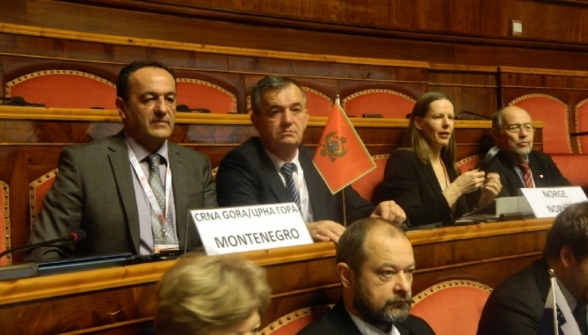Plenary session of the Conference of Parliamentary Committees for Union Affairs of Parliaments of the European Union – COSAC started today in Rome, under the Italian Presidency of the European Union, attended by members of the Committee on European Integration Šefkija Murić and Srđa Popović.
The meeting was opened by Pietro Grasso, President of the Senate, who assessed parliamentary part of Italian presidency as successful, which ends with this COSAC meeting. In the half-year period, new relationships between the stateswere established, and with the adoption of the important strategic decisions in December, new framework would be established for successful policies at the Union level, said Grasso. In the introductory part, the gathering with more than 200 parliamentarians, was addressed by the Italian Prime Minister Mateo Renzi, which critically commented on the current economic and social situation in the member states. He said that reforms at the EU level must be accelerated in member states as well, as competitive countries and systems efficiently transform their economies, adapting it to the market. We are in a time of essential stagnation because the measures for stabilization contributed to stopping the economic crisis, but not to the development of member states, said Italian Prime Minister, adding that Europe has no a promising future, if it does not change its direction in key policies. He recalled that Italy remained committed to the enlargement policy during its presiding, but that it focused the attention of Brussels on the problems of immigration from countries of North Africa and the situation in Ukraine.
In the context of the debate on the role of the European institutions and national parliaments, toward 5 years from the entry into force of the Lisbon Treaty, the focus of attention was a deficit of democracy, the crisis of the European idea and hostility of European citizens. In order to change the situation, it is necessary to specify the dialogue focused on fields of importance, with an aim to sign the inter-institutional contracts which would influence on the reform process. Although the Lisbon Treaty gave notice to a greater role of national parliaments, their role is mainly reduced to checking the principle of subsidiarity, so MPs and representatives of the European institutions must work together to strengthen the national power holders, state the participants of the COSAC.
Consideration of the Europe 2020strategy was continued, with a focus on growth, employment and competitiveness. Parliamentarians agreed that it was necessary to reduce poverty and unemployment rate, especially young people, which is unacceptably high in the Union. Labour markets are not adapted to technological changes of new economies, and the program of European Commission President Jean Claude Juncker does not contain policies that will compensate the enormous reduction of investment at EU level, it was pointed out by the participants. Finding of social indicators for the European semester, and the combination of investment and reforms in a sustainable equilibrium, could be a successful part of the solution for the current situation.
The meeting will be ended tomorrow with a discussion about the global role of the European Union and the projection of its policies in the Mediterranean and Eastern Europe, and about the democratic control of European agencies, and it is planned to adopt conclusions.









